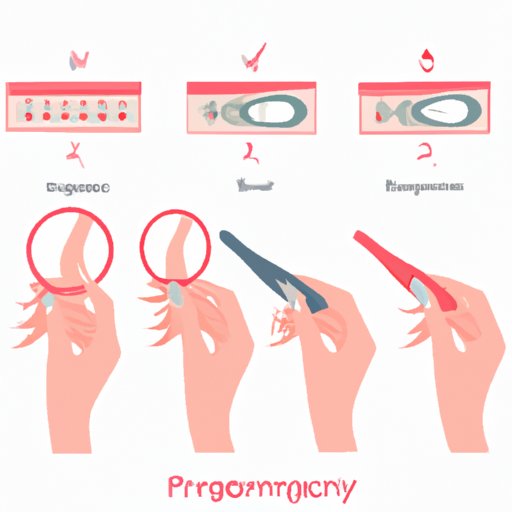Introduction
It’s not always easy to know if you’re pregnant, especially if it’s your first time. While some women experience no symptoms at all, others may experience common signs of early pregnancy. In this article, we’ll cover the various ways to tell if you’re pregnant, from the signs and symptoms to home pregnancy tests and medical confirmations.
Common Symptoms of Early Pregnancy
A missed period is the most obvious sign of early pregnancy for most women. However, there are several other symptoms to be aware of, such as morning sickness, fatigue, mood swings, and breast changes. Every woman’s experience is unique, and some women may not experience any symptoms at all.
Other common symptoms of early pregnancy include:
- Headaches
- Constipation
- Food aversions or cravings
- Frequent urination
- Acne
Home Pregnancy Tests
Home pregnancy tests are the most common way to confirm pregnancy at home. There are different types of pregnancy tests, including urine tests, digital tests, and early detection tests.
To use a home pregnancy test correctly, you should:
- Read the instructions carefully
- Take the test in the morning when urine is most concentrated
- Use a clean and dry container for the urine sample
- Wait for the recommended time for accurate results
Home pregnancy tests are generally reliable and accurate when used correctly. However, false negatives are possible if the test is taken too early or if there is not enough of the pregnancy hormone (HCG) in the urine yet.
Signs of Implantation
Implantation is when the fertilized egg attaches to the uterus lining, which occurs about a week or two after ovulation. Some women may experience signs and symptoms during implantation, such as spotting or cramping.
Other signs of implantation include:
- Light bleeding or spotting
- Lower abdominal cramping or pain
- Bloating or gas
- Lower back pain
- Mild nausea or headaches
It’s important to note that not all women experience these symptoms, and they can also be mistaken for period-related symptoms.
Changes in the Body During Pregnancy
Pregnancy brings about several changes in the body, both physically and hormonally. These changes can vary by person and trimester.
Some common changes that women may experience during pregnancy include:
- Breast tenderness or swelling
- Frequent urination
- Increased hunger or cravings
- Mood swings or anxiety
- Weight gain or bloating
To manage these symptoms, it’s important to stay hydrated, eat a healthy and balanced diet, get plenty of rest and exercise, and communicate with your healthcare provider if you have any concerns.
Medical Confirmations
While home pregnancy tests can give you a good indication of whether or not you’re pregnant, medical confirmations are necessary for a definitive answer. Medical tests that can confirm a pregnancy include ultrasound, blood tests, and pelvic exams.
If you suspect you’re pregnant, you should schedule an appointment with your healthcare provider. They can confirm your pregnancy and provide guidance on prenatal care.
It’s important to note that some medical tests may not be 100% accurate, especially if conducted too early in the pregnancy.
Understanding Ovulation
Understanding ovulation and when it occurs in your menstrual cycle can help you determine the best time for conception. Ovulation is when a mature egg is released from the ovaries, making it available for fertilization.
Some common methods for tracking ovulation include:
- Basal body temperature charting
- Ovulation prediction kits
- Fertility awareness methods (such as the cervical mucus method)
Determining the best time for conception can increase your chances of becoming pregnant and help you prepare for a healthy pregnancy.
Preventing Pregnancy
If you’re not ready for pregnancy, it’s important to take steps to prevent unintended pregnancy. Birth control can be an effective method for preventing pregnancy.
There are several types of birth control methods, such as:
- Condoms
- Birth control pills
- Intrauterine devices (IUDs)
- Depo-Provera injections
- Sterilization procedures
To ensure the effectiveness of birth control, it’s important to use them correctly and consistently. Additionally, practicing safe sex can also help prevent unintended pregnancy and reduce the risk of sexually transmitted infections (STIs).
Conclusion
In conclusion, there are several ways to tell if you’re pregnant, from common signs and symptoms to home pregnancy tests and medical confirmations. If you suspect you’re pregnant, seek medical advice from your healthcare provider. Understanding ovulation and birth control can also help you prepare for a healthy pregnancy and prevent unintended pregnancy. Remember to take care of yourself and listen to your body.
